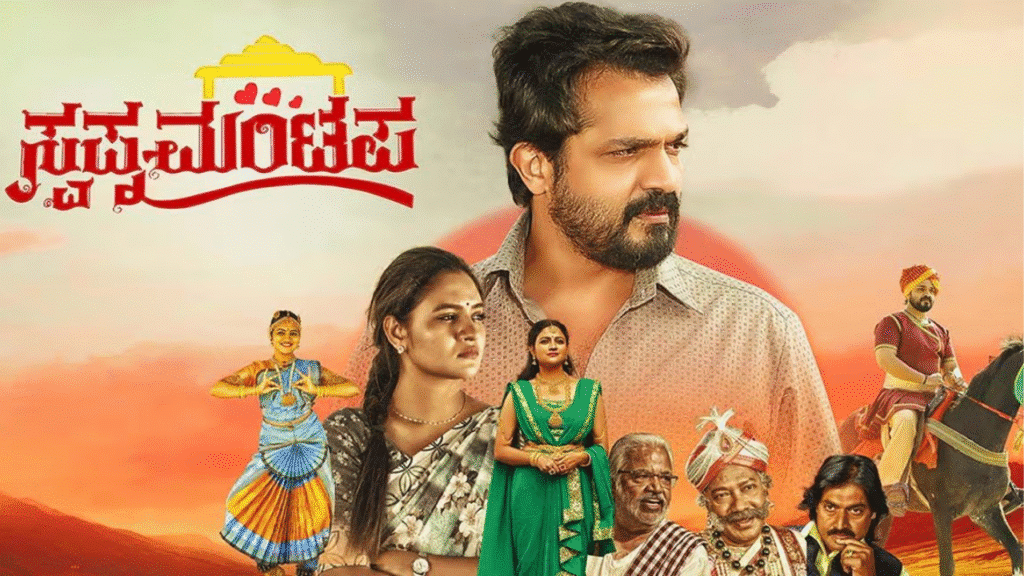Language: Kannada
Age Rating: U/A
Genre: Drama, Historical Fiction
In this Swapna Mantapa movie review, we delve into a thoughtful and visually poetic Kannada film that blends cultural introspection with personal awakening. Directed with a classical sensibility, the film features strong performances from Ranjani Raghavan, Vijay Raghavendra, and a compelling ensemble that brings history to life with grace and emotional depth.
Plot: History Through a Personal Lens
Manjula (Ranjani Raghavan), a high school teacher, arrives in a remote village and becomes drawn to the mysterious, forgotten structure known as Swapna Mantapa. Staying at the home of Sidappa (Sundar Raj), she encounters Shivakumar (Vijay Raghavendra), who introduces her to the legend of the place.
Through vivid storytelling, Shivakumar recounts tales of King Chanderaya and his queens—Nagaladevi and Madanike—and daughter Madalase. Manjula becomes emotionally invested, imagining herself as Madanike, and the lines between past and present blur as she begins to reflect on the echoes of women’s struggles across generations.
As the past seeps into her present, Manjula forms a deep connection with Shivakumar. Together, they face a pressing challenge: Bheemaraju (Ambarish Sarangi), who wants to sell the heritage site to resort developers, and Rajkumari (Ranjini Gowda), a mentally unstable woman whose presence adds emotional complexity to the tale. The duo embarks on a mission to preserve Swapna Mantapa, not just as a monument, but as a legacy.
Performances: Every Actor Adds Meaning
- Ranjani Raghavan is spellbinding as Manjula, carrying the film’s emotional weight with poise and sincerity. Her portrayal is both introspective and commanding.
- Vijay Raghavendra brings calm authority to Shivakumar, offering a grounded performance that complements Ranjani’s emotional arc.
- Sundar Raj, in a supporting role, lends dignity and warmth, portraying generational wisdom.
- Ranjini Gowda plays Rajkumari with quiet heartbreak, adding layers of empathy.
- Ambarish Sarangi as Bheemaraju is convincing as a man torn between profit and legacy.
Each member of the cast contributes to the larger narrative, and even minor characters feel well-rooted in the story.
Direction and Tone: A Theatrical, Artful Approach
The director leans into theatrical storytelling with stylized dialogue and long monologues in the flashback scenes, evoking the feel of a stage play. The tone is reflective, often meditative, prioritizing character over plot twists. This approach pays off in emotional depth but might test the patience of viewers used to brisk pacing.
Visuals and Music: Immersive and Understated
The cinematography is understated yet evocative, using natural landscapes and rustic architecture to reinforce the theme of timelessness. The film’s visual language mirrors its narrative intent—quiet, respectful, and rooted in tradition. The background score is subtle, enhancing the emotional undercurrent without overwhelming the scenes.
Strengths and Shortcomings
What Works:
- Thoughtful and layered performances
- A compelling narrative about cultural preservation
- Strong emotional resonance
- Effective use of history to comment on gender and identity
Where It Stumbles:
- Some sequences in the second act slow the narrative pace
- Theatrical tone might not appeal to younger or fast-paced cinema audiences
Cultural Relevance and Impact
As highlighted in this Swapna Mantapa movie review, the film thoughtfully questions what heritage means—not just as physical structures but as emotional legacies. It brings forward women’s voices from history and encourages a more nuanced understanding of the past. In doing so, it speaks to today’s urgent need to preserve culture with conscience and care.
Final Verdict: ⭐️⭐️⭐️⭐️ (4/5 Stars)
Swapna Mantapa is a soulful, artistic drama that asks meaningful questions about memory, legacy, and the stories we choose to save. Its slow rhythm and old-school storytelling won’t work for everyone, but for lovers of purposeful, performance-driven cinema, this is a rewarding experience.
Should You Watch It?
Yes—especially if you’re drawn to cinema that values history, identity, and introspection. It’s a quiet film with a powerful heartbeat.
Latest Movie Reviews
- Sarzameen Movie Review: A Stirring Emotional Thriller with Standout Performances
- Dear Maa Movie Review: A Powerful and Poignant Portrait of Motherhood and Ambition
- Saiyaara Movie Review: A Soul-Stirring Debut That Strikes the Right Chords
- Sarbala Ji Movie Review: A Delightful, Power-Packed Punjabi Wedding Comedy
- So Long Valley Movie Review: A Chillingly Beautiful Thriller That Delivers a Gripping Payoff
- Maareesan Movie Review: A Gripping and Rewarding Tale of Redemption and Unlikely Kinship
- Mahavatar Narsimha Movie Review: A Spiritually Powerful and Emotionally Rich Animated Epic
